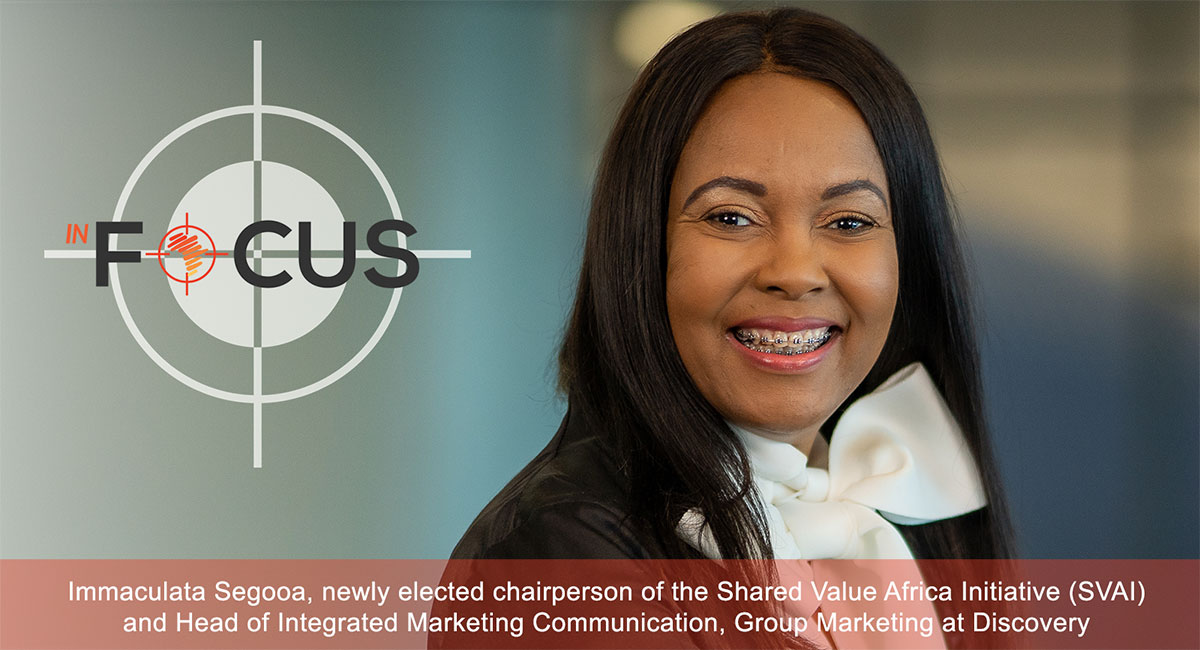In Focus – SVAI Chairperson
We check in with Immaculata Segooa, newly elected chairperson of the Shared Value Africa Initiative (SVAI) and Head of Integrated Marketing Communication, Group Marketing at Discovery, to find out more about her vision for SVAI and her thoughts on the role of African business in driving sustainable value creation in the year ahead.

As the newly elected chairperson of the SVAI, what is your vision for the organisation during your term?
My personal goal as the chairperson of SVAI is to advance the organisation’s purpose of establishing Africa’s most impactful shared-value business network. I envision a more robust shared-value community in Africa, with an emphasis on intercontinental connections that generate real-world value creation and sustainable impact.
This vision motivates me to be more deliberate about my own purpose and responsibilities during my tenure. I am proud of the progress we have made in creating shared value in Africa. Countless individuals have contributed to shaping and promoting shared value in various sectors, including corporate, government, business and civil society. Their efforts have yielded a wealth of success stories and best practices that we can build on.
I am truly inspired by the ground-breaking work that SVAI has achieved since its inception, particularly in witnessing the community of practitioners who have been part of the shared-value dialogue from the outset, and who are now starting to shape the narrative. As I reflect on our progress, I would like to express my sincere gratitude to the SVAI board, our outgoing chair, Sazini Mojapelo, and the broader community for their unwavering dedication in driving strategic adoption of shared-value creation. Their activism has been instrumental in creating a sustainable future for Africa through shared value.
I am committed to working closely with the SVAI, its partners and its stakeholders to extend our footprint and operate at scale across the continent by 2030. Achieving this ambitious goal will require the active participation of our members and partners, whom I urge to share their success stories and demonstrate tangible societal impact.
The aim is to move beyond simply discussing the framework, and to focus more on practical application of how the shared-value model has transformed business, and delivered value for clients while addressing systemic societal challenges. Demonstrating this impact is critical, as it will inspire other businesses, countries and governments that have not yet embraced this philosophy to see its effectiveness and encourage them to adopt the model.
What is your call to action for shared-value stakeholders across the continent?
I challenge all scholars, practitioners and advocates of shared value to evaluate their business models, strategies, and policies through an equality lens. As a continent with an average Gini coefficient of .41 in 2021 [1], inequality poses a significant obstacle to progress and threatens to undermine the very principles on which shared value is founded. We must work together to promote greater equity and inclusion in our communities, businesses and economies.
What do you see as the most important change for business across Africa to embrace in 2023 to help drive realisation of the SDGs by 2030?
I strongly believe that business has a critical role to play in establishing a sustainable shared-value ecosystem in partnership with government and civil society. More specifically, the implementation of shared value at the policy level will be key to achieving the seismic shift we need to realise the SDGs. Business has the skills, resources, and capacity to make this happen, but we must ensure that every policy in an organisation is examined through a shared-value lens, promoting relevance, equity (agility to adapt products and value chains to be responsive) and practicality with equality and fairness.
Although macro-economic and socio-political factors such as climate change, ongoing wars, recovery from the COVID-19 pandemic, population growth and life expectancy are beyond our control, we have the foundation for every stakeholder to contribute to creating a sustainable society and planet. The Africa we want is defined as part of Agenda 2060, and embedding shared value within this agenda as a practice will shift the needle towards realising the SDGs.
I am of the view that rather than focusing on whether achieving the SDGs by 2030 is realistic, an SDG index – not only at the global and country levels, but also right down to organisational levels – will be instrumental in helping us shift the dial annually with accountability metrics. In doing so, we will also ensure a sustainable model for future generations to progress humanity and create new realities. SVAI is currently exploring this concept, and welcomes thoughts from our members and the broader shared-value community.
At SVAI, our strategic pillars and key engagement platforms, including the annual summit, CEO and Entrepreneurship Forums, the Shared Value Africa Academy, the ITSNOTOK movement, and the JamiiTrade initiative, represent collaborative means through which we are helping our members build the Africa we want.
I’m encouraged by the shift in the African narrative regarding shared value in recent years. More and more organisations are defining their organisational purpose, adopting the shared-value model, and customising it to suit their unique needs. This was very evident at last year’s Shared Value Africa Summit in Rwanda, with government actively engaging in the dialogue, and young entrepreneurs being energised and mobilising to launch shared-value start-ups. Scaling this through an increased footprint beyond the 15 countries that SVAI is already active in will be the groundswell we need to achieve sustainable impact.
Ultimately, the importance of sustainable impact and value creation cannot be overstated. This calls for leadership to lead ethically and with empathy. By prioritising these core business principles, organisations can create a more just and equitable world, and a healthy bottom line to ensure their long-term sustainability.
[1] Annual Development Effectiveness Review 2022 of the African Development Bank Group




